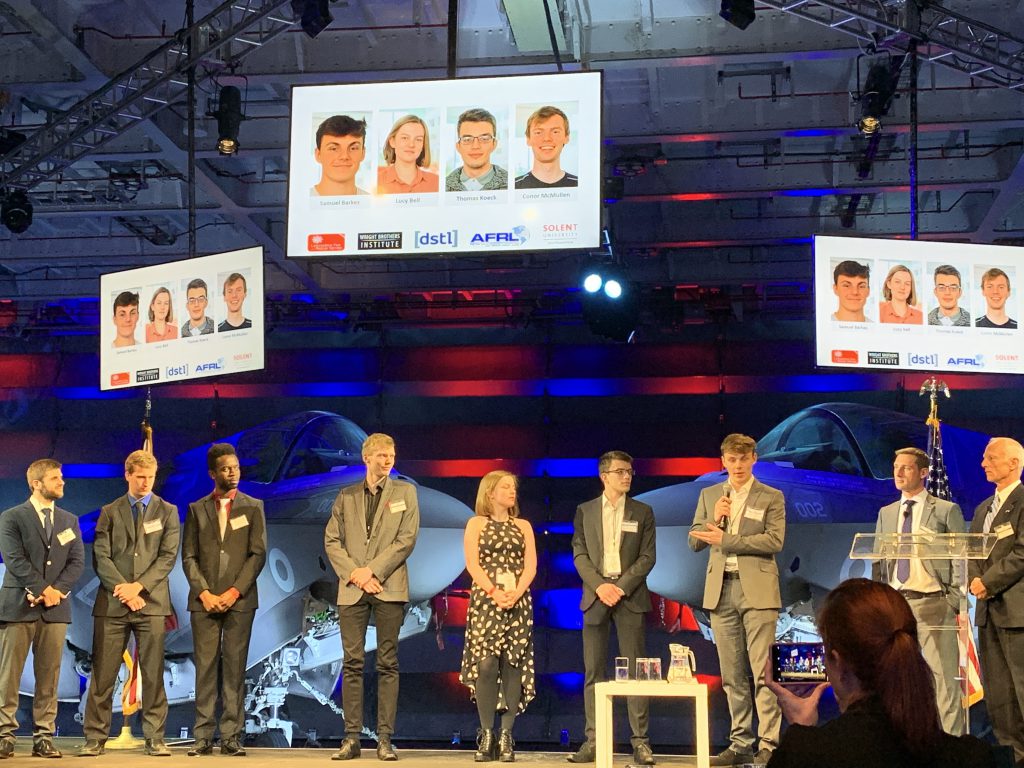Swarm and Search AI Challenge winners recognized during visit of HMS Queen Elizabeth
WRIGHT-PATTERSON AIR FORCE BASE, Ohio – A team of three students from the University of Michigan and a four-member team comprised of both high school and college students from the United Kingdom received Royal treatment as guests on board the HMS Queen Elizabeth Nov. 20, when they were recognized as winners of the “Swarm and Search AI Challenge: 2019 Fire Hack.”
The Air Force Research Laboratory and the United Kingdom Defence Science and Technology Laboratory (DSTL), in collaboration with the Wright Brothers Institute (WBI), sponsored and conducted the challenge, which explored new, efficient and resilient ways to plan complex Unmanned Aerial Systems (UAS) search and rescue missions.
The Royal Navy aircraft carrier HMS Queen Elizabeth arrived in Annapolis, ready to host a series of events aimed at bringing together great minds from a host of nations to discuss the future of Defence capability, according to a UK press release.
It was an historic visit by a Royal Navy ship to Annapolis, with only one other ship from the UK officially visiting the city’s port in the last century – and that was HMS Bigbury, more than 60 years ago, according to the release. What’s more, Annapolis – as the home of the United States Naval Academy – is a fitting place to bring together the UK and U.S. Defence communities, alongside other NATO allies, to further strengthen the enduring collaboration, which is a lynchpin of the special relationship.
The events on the carrier – a Defence and Security Trade exhibition on Nov. 20, followed by the Atlantic Future Forum on Nov. 21 – were an opportunity to encourage further co-operation not just between nations, but between the public and private sectors too.
“We’re delighted to be here for this historic visit to Annapolis,” said HMS Queen Elizabeth’s Commanding Officer, Commodore Steve Moorhouse, in a statement from the release. “HMS Queen Elizabeth represents the very best of UK industry and technology, so it is particularly pertinent that we should be hosting these two exciting events on board – including the second ever Atlantic Future Forum. The UK-U.S. relationship continues to go from strength to strength, as demonstrated by the support we have received from the U.S. Navy, Marines and Air Force throughout our journey to bring our new carriers and jets in to service. It is events like these, which help to reinforce, develop and bring new relevance to this vital relationship as we prepare together for any future threats we face.”
The theme of the “Swarm and Search AI Challenge: 2019 Fire Hack” revolved around mapping wildfires and assumed that improved mission planning, and the ability to react to dynamic changes has the potential to minimize damage and save lives. Solutions created during the challenge may also apply to defense applications.
Teams worked remotely, via a closed, online collaboration platform to explore different fire map scenarios, using Air Force-licensed software. Thirty-nine U.S. teams benefitted from exposure to new markets and a chance to test their technology against their competition.
Concurrent challenges in the United States and the United Kingdom concluded with a final international showdown that took place March 29-31, 2019, among the top nine teams after four different increasingly complex rounds of competition.
AFRL and DSTL utilized this innovative approach to find the best Artificial Intelligence (AI) or Machine Learning (ML) algorithms the embody efficiency and resiliency.
“It has been fantastic to be able to work with DSTL on this project,” said Mick Hitchcock, AFRL program manager. “The activity fit right into both countries’ desire to approach research differently, and involved non-traditional, innovative thinkers as partners and most importantly, helped get results faster.”
The competition was not between two countries, but to highlight the ability to rapidly work together on tough problems.
“I’m most proud of the relationship that we have with the Air Force Research Lab and also the Wright Brothers Institute,” said Timothy Wright, DSTL’s Aerospace Systems Group Leader. “The relationship that we have has really enabled us to turn out what was an incredibly exciting, enlightening, innovative, and enthralling event.”
“This is the future, this is how we’re going to do business,” said Jack Blackhurst, AFRL Executive Director. “We want to look at all kinds of ideas and the only way you do that is to get outside to the external environment of the Air Force and talk with people and let them play. That’s what we’re doing.”
“These sort of experiments that we’re running – these sort of approaches are going to allow us to mine technology in a way that we never were able to before,” Hitchcock said.
Future challenges are anticipated and more information will be available at AFRL’s website at www.afresearchlab.com.

